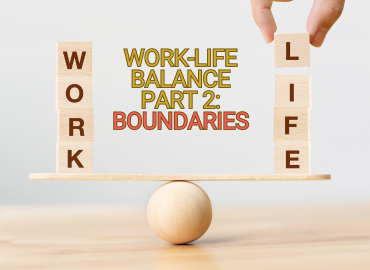Work-Life Balance, Part 2: Boundaries
As part 2 of our series on work-life balance, this post will do a quick examination of boundaries. According to the Oxford Dictionary, a boundary is a line that marks the limits of an area. It can also mean the limit of a subject or sphere of activity. Boundaries can be real, like a fence around someone’s property. They can also be immaterial, like a time zone line.
We cannot control many of our circumstances, but setting boundaries is an important way to deal with them. Here are just a few of the million reasons to work on setting boundaries:
- Boundaries set limits but they’re also freeing.
- Boundaries help us find balance.
- Boundaries are self-care.
- Boundaries encourage consistancy.
- Boundaries encourage self-knowledge.
- Boundaries are empowering and encourage self-direction.
Let’s go a little Here are a few different types of boundaries:
- Boundaries for your health, such as working provisions for a health need into one’s day
- Boundaries for your time, ie. what your time belongs to and when.
- Boundaries in your relationships.
Establishing limits is healthy for relationships as they can prevent problems before they begin. Also, the parties in the relationship can know each other better through the priorities that boundaries reveal. So many relationships suffer because of a lack of clearly stated boundaries.
These are a few examples of boundaries in relationships:
- Extended family doesn’t get to visit without
- No raised voices when arguing.
- A healthy division of labor.
- Parenting methods, if applicable.
Boundaries at work are important for protecting one’s rights and doing one’s best work. Here are some examples of boundaries at work:
- Not being connected after a certain time of day.
- Not being available for meetings on certain days or times.
- Not performing tasks that aren’t aspects of your job, or only doing favors up to a point.
- Insisting on having the right resources and environment to do your work.
Lastly, one very important person to set boundaries with is ourselves. Boundaries like these:
- I will not snack between dinner and bedtime.
- I will give myself no less than an hour to work out.
- I will not be mad at myself if my body can’t do as much as I want it to.
- I will reverse my negative self-talk into affirmations as many times as I can today.
Psychotherapy services are a great way to help build confidence in setting and maintaining healthy boundaries. We offer remote talk therapy to aid with accessibility. Ask about our metabolic workups and NeuroStar transcranial magnetic stimulation. Contact us on our website or by calling (585) 442-6960.





